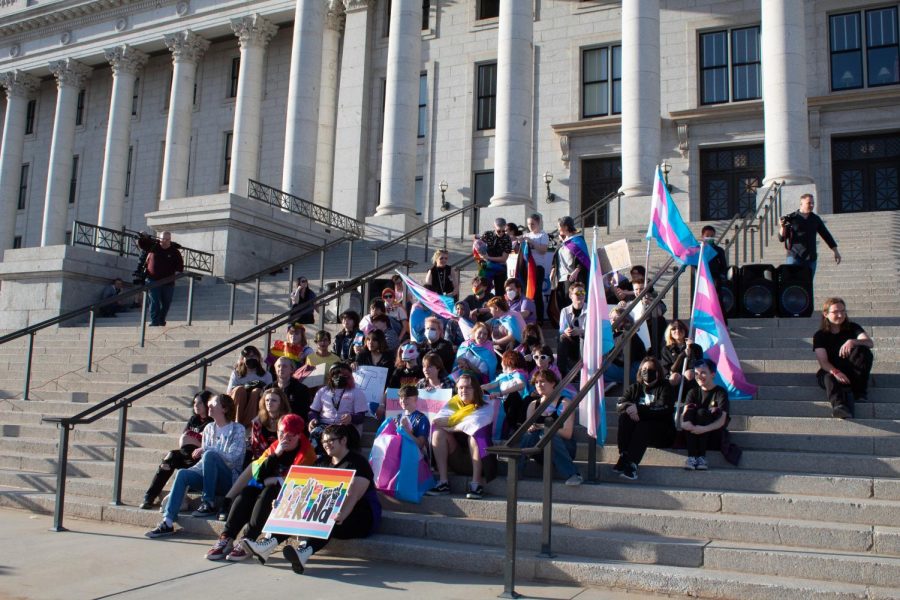Cowley: Trans Bodily Autonomy is Being Threatened
Transgender youth sit on the steps at the Utah State Capitol on March 24, 2022 as the crowd surrounding them chanted “We love you.” (Photo by Carlene Coombs | Daily Utah Chronicle)
July 21, 2022
The right to bodily autonomy is under threat in the United States. With the landmark ruling of Roe v. Wade being overturned last month, the future of access to reproductive healthcare is extremely uncertain. But the overturning of Roe v. Wade doesn’t only affect women. It impacts trans and nonbinary people as well.
On top of dissolving the right to choose whether or not to carry a pregnancy, legislation across the nation is targeting gender-affirming healthcare. The U.S. becomes more and more anti-trans as more trans-targeting laws get introduced every year. Limiting access to gender-affirming healthcare is just another way lawmakers are taking away people’s bodily autonomy.
Anti-Trans Laws in the U.S.
The U.S. is experiencing a wave of anti-trans legislation across the country. As of March 2022, 15 states have passed laws that restrict access to gender-affirming healthcare. For example, this year the Ohio Legislature proposed a bill that would “prohibit certain procedures to alter a minor child’s sex.” The legislation’s vague wording means that if the bill is passed, it could be used to justify all sorts of discrimination against trans youth. Bills like Ohio’s open up doors for stricter legislation that affects older trans people as well. Each proposal creates larger, deadlier consequences for the trans community as a whole.
Such discriminatory bills have also been introduced here in Utah. Equality Utah has kept an ongoing list of introduced anti-trans legislation. Last year, a bill banning transgender children from competing in school sports went into effect — yet another dive at the LGBTQ+ community.
As much as we would like to believe that the U.S. has taken steps toward acceptance, this recent wave of discriminatory bills has catapulted us backwards.
Consequences of Restricting Gender Affirming Healthcare
Restricting gender affirming healthcare for trans and nonbinary people will have devastating effects on trans adults and youth alike. Puberty blockers and other treatments used to help transgender youth can drastically improve a person’s quality of life. The blockers can postpone puberty, giving children who are questioning their gender identity more time to figure out their options and decide what’s best for them. Puberty can be an extremely difficult and devastating experience for trans youth. Having the option to transition at a younger age can help alleviate major symptoms of gender dysphoria.
Gender dysphoria can be crippling. Having early access to gender affirming healthcare gives trans youth the opportunity to alleviate dysphoria that might worsen later in life. A lack of gender-affirming healthcare devastates trans people of all ages, but especially at such young ages — support and care are critical. Trans youth are more likely to experience anxiety, depression and other mental health issues. Taking away essential care maximizes discomfort for trans people and will only make mental health struggles worse.
The Importance of Bodily Autonomy
In almost every other legal proceeding, the court recognizes a person’s right to choose what to do with their body. In the 1978 case McFall v. Shimp, the Court ruled that no person could be legally compelled to participate in a lifesaving medical treatment to save another person’s life. This case upholds our inherent right to bodily autonomy, regardless of whether or not it’s deemed moral.
Historically, the removal of bodily autonomy can lead to extreme consequences. In cases of forced or coerced pregnancy, the mental and emotional consequences can last for the rest of a person’s life. The same goes for trans people, who already experience severe discrimination. Stripping them of their right to choose not only makes their lives harder, but yields devastating long-term psychological consequences.
Being trans does not require that you must medically transition, but everyone should have the choice of whether to do so. The absence of choice is deeply saddening and frustrating. Everyone deserves to have ownership of their own body, no matter what. T
he attitude towards trans and nonbinary people in the U.S. is still hostile. Gender-affirming healthcare remains incredibly difficult to attain in many places, and expensive at that. Legislators should have the common sense to make healthcare more accessible for everyone, not more difficult to obtain.












